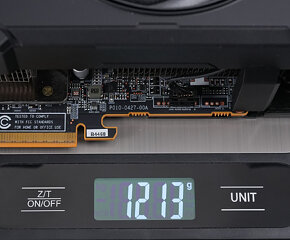 115
115
Sapphire Radeon RX 9070 XT Pulse Review
Circuit Board Analysis »Packaging
The Card
The RX 9070 XT Pulse follows the color theme of earlier Pulse GPUs—black and red are the primary colors. You now get a metal "Sapphire" logo near the top edge and some additional detail has been added in that area, too. The metal backplate that has a cutout for air to flow through.
Dimensions of the card are 32.0 x 13.0 cm, and it weighs 1213 g.
Installation requires three slots in your system. We measured the card's width to be 60 mm.
Display connectivity includes two standard DisplayPort 2.1a and two HDMI 2.1b ports.
With RDNA 4, AMD put effort to improve its standing with game streamers and creative professionals. It's done this by giving Navi 48 a dual VCN solution, so the GPU has two concurrent hardware accelerators for encoding and decoding. Perhaps the biggest changes at the silicon level is that AMD improved the encoding quality of its hardware H.264 and HEVC codecs. This was a niche complaint streamers had with AMD GPUs, and would avoid the brand altogether. The company also updated its AV1 hardware acceleration with support for B-frames, which are frames that lack image information, but math data that let the decoder reconstruct image data by comparing with the image data from adjacent I-frames containing it. This technique vastly improves streaming bitrates since half the frames lack image data.
There is no lighting on the RX 9070 XT Pulse.
The card uses two 8-pin power connectors, which allow a maximum of 300 W power draw, plus 75 W from the slot.
Teardown
Sapphire's card lets you remove and replace the fan assembly without touching the thermal paste. This makes it easy to fix the fans after a few years if their bearings are worn out.
The Sapphire cooling solution uses five heatpipes. The heatsink provides cooling not only for the GPU, but also for the memory chips and VRM circuitry.
The backplate protects the PCB against damage during handling and installation.
Apr 4th, 2025 09:25 EDT
change timezone
Latest GPU Drivers
New Forum Posts
- 5070 cards available below £550 in in the UK (27)
- The TPU UK Clubhouse (26048)
- A dozen drivers for HD4670, and which do I choose? (3)
- Will I need an PSU upgrade (0)
- RX 9000 series GPU Owners Club (147)
- Show us your backside! (15)
- 4x16gb how are these? (25)
- TPU's Nostalgic Hardware Club (20165)
- Your PC ATM (35327)
- Is RX 9070 VRAM temperature regular value or hotspot? (318)
Popular Reviews
- DDR5 CUDIMM Explained & Benched - The New Memory Standard
- PowerColor Radeon RX 9070 Hellhound Review
- Corsair RM750x Shift 750 W Review
- Sapphire Radeon RX 9070 XT Pulse Review
- Pwnage Trinity CF Review
- Sapphire Radeon RX 9070 XT Nitro+ Review - Beating NVIDIA
- Upcoming Hardware Launches 2025 (Updated Apr 2025)
- SilverStone Lucid 04 Review
- Palit GeForce RTX 5070 GamingPro OC Review
- AMD Ryzen 7 9800X3D Review - The Best Gaming Processor
Controversial News Posts
- MSI Doesn't Plan Radeon RX 9000 Series GPUs, Skips AMD RDNA 4 Generation Entirely (146)
- Microsoft Introduces Copilot for Gaming (124)
- AMD Radeon RX 9070 XT Reportedly Outperforms RTX 5080 Through Undervolting (119)
- NVIDIA Reportedly Prepares GeForce RTX 5060 and RTX 5060 Ti Unveil Tomorrow (115)
- Over 200,000 Sold Radeon RX 9070 and RX 9070 XT GPUs? AMD Says No Number was Given (100)
- NVIDIA GeForce RTX 5050, RTX 5060, and RTX 5060 Ti Specifications Leak (96)
- Retailers Anticipate Increased Radeon RX 9070 Series Prices, After Initial Shipments of "MSRP" Models (90)
- Nintendo Switch 2 Launches June 5 at $449.99 with New Hardware and Games (90)



















